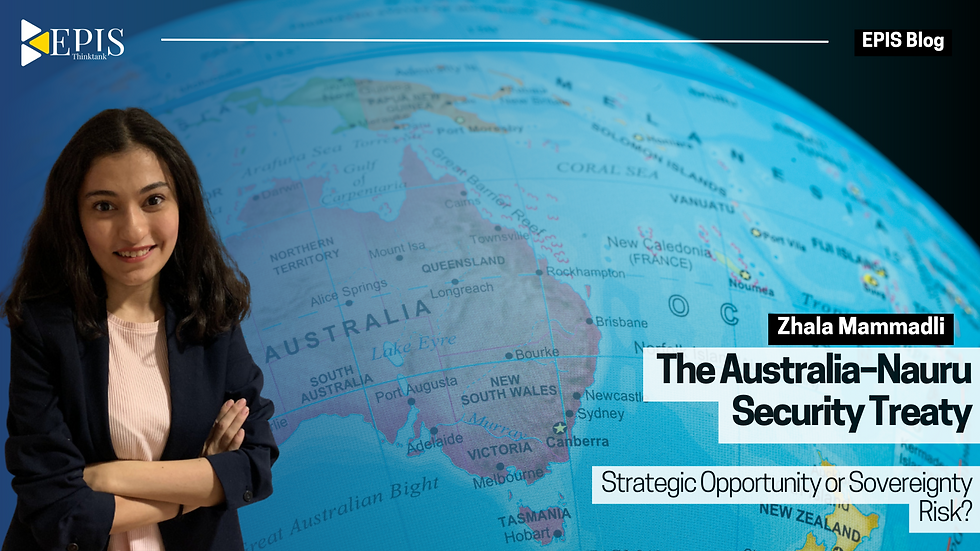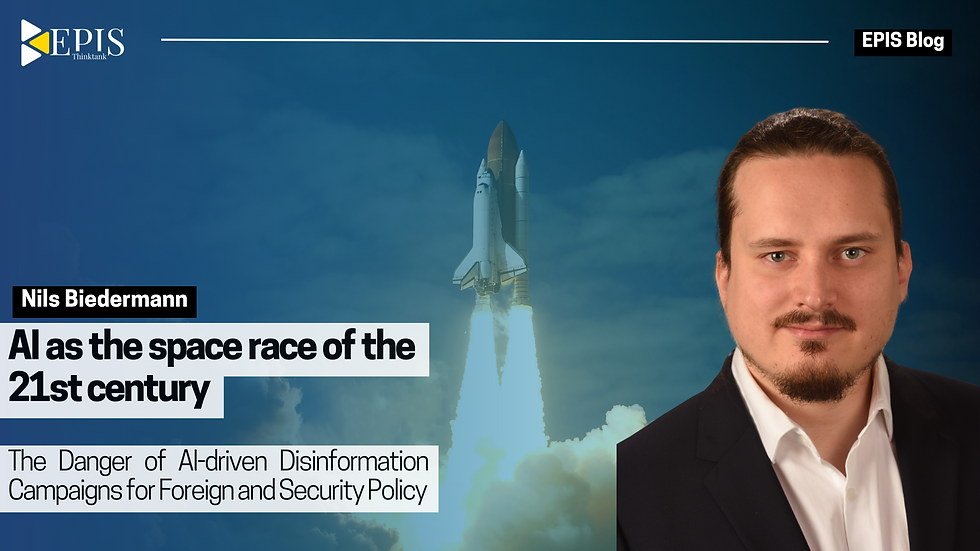Why Did Moscow Recognize Afghanistan's Taliban?: Counter ISIS-K, energy transit, labour needs, and regional reactions to Russia's move
- EPIS Think Tank

- 3 days ago
- 4 min read

The Taliban has served as Afghanistan's de facto authority since its August 2021 takeover, which followed the US–Taliban Doha Agreement and the subsequent withdrawal of the American army. Afghanistan has faced punishing trade restrictions and diplomatic isolation, since then. This makes Russia’s formal recognition of the Taliban as Afghanistan’s government on the 4th of July more surprising since they are, as of yet, the only country that has taken this step. What are the reasons for this declaration? What will this mean for the Taliban, will other countries follow, and what are the consequences for global politics?
History of Russo-Afghan Relations
Russia's relationship with Afghanistan began with 19th-century Great-Game diplomacy, where the Brits and Russians fought for political influence in the region. After the 1907 Anglo-Russian Convention forced a pause, Moscow re-engaged in 1919, becoming the first to recognize Afghan independence and soon sealing a 1921 friendship treaty and a 1928 non-aggression pact that anchored a notably friendly decade. Post-1945, Soviet dams, roads and officer schools bound Kabul to Moscow, leaving Afghanistan heavily reliant on Soviet credit by the 1970s. The real turning point came with the 1979 Soviet invasion, which the Soviets saw as necessary to help the communist government in Afghanistan. This fuelled a jihadist insurgency that bled the USSR and plunged Afghanistan into civil war. The Taliban captured Kabul in 1996. After the US-led invasion, caused by 9/11, Moscow quietly supported the US-led intervention by opening air corridors and sharing intelligence, framing the move as a shared front in the war on terror.
The enemy of my enemy…
To many, it was surprising to see the recognition of the Taliban by the Russians, but when looking at it with a geopolitical lens, it becomes clearer. Both Afghanistan and Russia have conflicts with Jihadist groups, ISIS-K in particular. The Taliban pledged to counterterrorism during the Doha agreement with the US. They also claimed in December 2021 that they arrested more than 600 ISIS-K members in a few months and destroyed 25 ISIS-K hideouts in Kabul and Jalalabad. Russia has also struggled with militant jihadist groups. ISIS-K claimed one of the worst recent terror attacks in a concert in Moscow in March last year. The notorious group has a web of connections in central and East Asia, which in turn makes connected counterterrorism more attractive. This is explicitly mentioned by Kabulov, Russian representative to Afghanistan. He said Russia sees and appreciates the Taliban’s efforts in fighting the Afghan branch of IS Khorasan, the ISIS (Daesh) terror group's regional branch in Central and South Asia. “This group is a common enemy for Russia and Afghanistan, and we will provide all possible assistance to the authorities of this country through specialized structures,” Kabulov said.
Economic Relations
Another reason, according to political analysts, is more economic in nature. Russia struggles with a shortage of workers and seeks for ways to solve that. According to Baza media, the Taliban agreed to bring 1000 Afghan workers to Russia. Most of those Afghan workers in Russia are ‘’installers, welders, painters, electricians and other highly qualified specialists’’ according to Russian representatives. Furthermore, trade agreements are key in understanding the relationship between the states. At the KazanForum 2025 Afghanistan plans to sign a deal allowing 50 million m³ of Russian LNG to cross its territory and route to Southeast Asia, according to Rustam Khabibullin, head of the Russian Business Centre in Kabul. Trial shipments have already taken place, highlighting Kabul’s growing role as a transit corridor. The forum has seen similar agreements before: in 2023 for 50 million tones of Russian oil products and in 2024 for 2 million tones of wheat and flour. Khabibullin adds that bilateral trade hit $1 billion by May 2024, driven largely by oil, grain and dairy exports.
How did the region react?
Even though no other country has formally recognized the Taliban as the legitimate authority of Afghanistan as of now, multiple states have been moving closer. China has openly welcomed Russia’s latest decision and together with Pakistan, they have had trilateral meetings with Afghanistan. Iranian officials have also held talks with the Taliban. Analysts cite the containment of ISIL as a major reason for this, which Iran has had struggled with even in recent times. They have also had talks regarding cooperation in economic and logistical relations. India has also had more diplomatic contact with the Taliban, together with growing investments of more than $3bn spread over more than 500 projects across Afghanistan, including roads, power lines, dams, hospitals and clinics. A major reason for this is probably bypassing and pressuring their biggest rival Pakistan. The last-mentioned state has a mixed relationship with the Taliban. Pakistan has accused the Taliban of harbouring terrorists and has launched strikes into Afghanistan’s territory. This fact, together with the West’s general negative view of the Taliban amidst human rights violations also underscores the continued criticism of normalisation with the Taliban.
What will this mean for global politics?
This trend of normalising the Taliban shows that geopolitics is very complex, where we see alliances between former enemies and states that have little in common. It can also be seen as another example of the slow erosion of the liberal international world order which was established after the second world war. This is a global system where international relations are governed by a set of agreed-upon rules, norms, and institutions and where shared values like human rights, democracy and rule of law are respected. We live in a time when the Liberal international world order loses its influence.



Comments